Jan 04, 2026
Jan 04, 2026
The latter half of 1950s – Part 2
RK Films’ next film, Ab Dilli dur nahin (1957), directed by Amar Kumar, with music by Dattaram, who was part of the Shankar Jaikishen team for many years, was a low budget film. Based on a story by Rajinder Singh Bedi, it is about a young boy who travels to Delhi to meet the Prime Minister, to seek justice for his father who has been sentenced to death wrongly. Two songs from the film, Yeh chaman hamara apna hai, sung by Asha Bhonsle and Geeta Dutt, and Chun Chun karti aayi chidiya, sung by Mohammed Rafi, became popular. The latter is one of the best children’s songs in Hindi films.
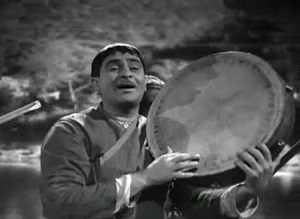 RK Films’ next production Jis desh mein ganga behti hai was released only in 1960. Meanwhile, Raj Kapoor acted in several successful films.
RK Films’ next production Jis desh mein ganga behti hai was released only in 1960. Meanwhile, Raj Kapoor acted in several successful films.
AVM’S Chori Chori was a remake of the American film, Frank Capra’s It Happened One Night (1934). With Manna Dey singing for Raj Kapoor, Shankar Jaikishen produced some memorable tunes. Manna Dey and Lata Mangeshkar duets Ye raat bhigi bhigi, Aaja sanam madhur chandni, and Lata Mangeshkar’s solos, rasik balma and panchhi banoo udti phirun can be heard in music assemblies even today. AV Meiyappan, owner of AVM Productions, visited Mumbai, to see the recording of the songs. He was upset to find Manna Dey singing for Raj Kapoor instead of Mukesh, threw a tantrum, and wanted to stop the recording. Raj Kapoor intervened and told Meiyappan firmly that Manna Dey would sing for him. It was the last film in which Raj Kapoor and Nargis played the lead.
Sharda (1957), directed by LV Prasad, was the remake of a Telugu hit Ilavelpu (family deity) with Raj Kapoor and Meena Kumari in the leads and Shyama in an important role. LV Prasad is a legend of Telugu movies. His name is immortalized by the LV Prasad Eye Institute, Hyderabad, set up by him to provide free treatment for the poor. Prasad started his career in Mumbai, acting in the first talkie of Indian cinema Alam Ara (1931). He worked in Mumbai up to 1941 as an actor and Assistant Director, before moving to Chennai to work in South Indian movies. Music director C Ramchandra gave us one of the best female duets of all time, O chand jahan woh jayen, sung by Lata Mangeshkar and Asha Bhonsle.
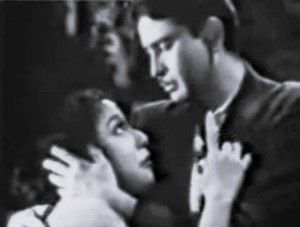 Ramesh Saigal’s Phir Subha Hogi, based on Fyodor Dostoevsky's Crime and Pumishment, starred Raj Kapoor and Mala Sinha. Phir Subha Hogi was a well-made film with fine performances by Raj Kapoor and Mala Sinha. Khayyam composed beautiful music for the film, with Sahir Ludhianvi’s lyrics apt for the theme in Woh subah kabhi tho aayegi, reflecting the conditions of the time, in Chin-o-arab hamara and Aasma pe hai khuda, romantic, in Phir na kije meri gustakh nigahi ka gila, and philosophical, in Do boonden savan ki. Chin-o-arab hamara was a parody on Iqbal's poem Tarana-e-Milli, in which the author of Sare jahan se achchha hindostan hamara (Our India is the best in the world), writes
Ramesh Saigal’s Phir Subha Hogi, based on Fyodor Dostoevsky's Crime and Pumishment, starred Raj Kapoor and Mala Sinha. Phir Subha Hogi was a well-made film with fine performances by Raj Kapoor and Mala Sinha. Khayyam composed beautiful music for the film, with Sahir Ludhianvi’s lyrics apt for the theme in Woh subah kabhi tho aayegi, reflecting the conditions of the time, in Chin-o-arab hamara and Aasma pe hai khuda, romantic, in Phir na kije meri gustakh nigahi ka gila, and philosophical, in Do boonden savan ki. Chin-o-arab hamara was a parody on Iqbal's poem Tarana-e-Milli, in which the author of Sare jahan se achchha hindostan hamara (Our India is the best in the world), writes
Chin-o-Arab hamara
Hinduston hamara
Muslim hain hum watan hai
Sarah jahan hamara
(China and Arabia are ours,
India is ours,
We are Muslims, our home is the whole world)
Raj Kapoor and Mehmood performed well in Parvarish, a film with an off-beat story. Under the music direction of Dattaram, Manna Dey sang for Raj Kapoor in the duets, masti bhara hai sama, and beliya beliya with Lata Mangeshkar, and Mama ho mama with Mohammed Rafi, but Mukesh’s solo, Aansoo bhari hain, moved our hearts and climbed the charts.
Kanhaiya, starring Raj Kapoor and Nutan, is about a devotee of Lord Krishna (kanhaiya), who mistakenly assumes that the village drunk is her favourite deity. Music directors Shankar Jaikishan once again gave some good tunes. Mukesh’s solos, Ruk ja O jane wali, and Yad aayi adhi rat ko were hits. Mujhe tumse kuchh bhi na chahiye is one of the greatest songs of Mukesh. Main Nashe Mein Hoon was another film on a drunkard, with music by Shankar and Jaikishan, starring Raj Kapoor and Mala Sinha. Two Mukesh solos, Main Nashe Mein Hoon and Kisi Nargisi Nazar became popular.
Khwaja Ahmad Abbas’s Char dil char raahen narrates three stories connected with a four way crossing. Raj Kapoor, and Shammi Kapoor acted together for the first time, along with Meena Kumari, Nimmi and Kumkum. Music director Anil Biswas, and lyricist Sahir Ludhianvi produced some melodious songs including, Kachhi hai umariya sung by Meena Kapoor, Nahi kiya to karke dekh by Mukesh and Intezar aur abhi aur abhi by Lata Mangeshkar.
After her breakup with Raj Kapoor, Nargis starred in IS Johar’s Miss India (1957) with Pradeep Kumar. The film was a moderate success, but Nargis showed us what a good actress she was without Raj Kapoor. India had just adopted the metric system for its currency. IS Johar engagingly describes the new system in the song Badla Zamana, written by Rajinder Krishna and sung by Mohammed Rafi.
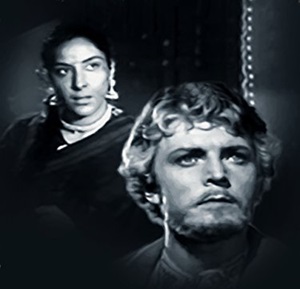 Nargis also acted with distinction in Pardesi, an Indo-Soviet co-production, jointly directed by Khwaja Ahmad Abbas and Vasili Pronin. The film tells the story of a 15th-century Russian trader, played by Oleg Strizhenov, who falls in love with an Indian girl. Anil Biswas gave some memorable tunes, such as Rasiya re man basiya re, by Meena Kapoor, and Phir milenge jane wale by Manna Dey. Lata Mangeshkar sang a beautiful Bharatanatyam thillana, danced by Padmini.
Nargis also acted with distinction in Pardesi, an Indo-Soviet co-production, jointly directed by Khwaja Ahmad Abbas and Vasili Pronin. The film tells the story of a 15th-century Russian trader, played by Oleg Strizhenov, who falls in love with an Indian girl. Anil Biswas gave some memorable tunes, such as Rasiya re man basiya re, by Meena Kapoor, and Phir milenge jane wale by Manna Dey. Lata Mangeshkar sang a beautiful Bharatanatyam thillana, danced by Padmini.
Dev Anand had several successful films in a row, Guru Dutt Production’s CID, directed by Raj Khosla, Baarish, inspired by the American movie On the Waterfront, winner of the Academy Award in 1954, Filmalaya production Paying Guest, Navketan’s Funtoosh, Nau Do Gyarah, and Kala Pani, Raj Khosla's Solva saal, and Subodh Mukherjee’s Love Marriage.
CID was inspired by William Wyler’s Detective (1951). It was Indianized by the addition of songs and dances. Raj Khosla showed his ability to handle suspense situations and made several suspense films in later years. CID marked the debut of South Indian dancing star, Waheeda Rehman, who established herself as one of the most talented actresses in Hindi films. Waheeda Rehman had acted in a couple of Telugu films, including a song and dance sequence Eruvaka sagaro in Rojulu marayi (Days have changed), which became a rage in South India. This sequence drew Guru Dutt's attention and led him to cast her in CID. Later, SD Burman liked the air and used it to compose Dekhne me bhola hai for Bombay ka babu (1960). OP Nayyar’s music earned him a nomination for the Filmfare Award. Ye hai Bombay meri jaan, adapted from the American folk tune, Oh My Darling, Clementine topped the Binaca Geetmala hit list in 1956. Aankhon hi aankhon me, Leke pehla pehla pyar, and songs recorded on Waheeda Rehman, Jaata kahan hai diwane, and kahin pe nigahen kahin pe nishana were hits.
Shankar Mukherjee’s Baarish, was adapted for the Hindi screen by Gyan Mukherjee, with Dev Anand and Nutan in the lead. C Ramchandra provided the music and composed several popular tunes including, dane dane pe likha hai sung by Chittalkar, kehte hain pyar jisko, a duet by Chttalkar and Lata Mangeshkar, Phir wahi chand wahi hum by Lata Mangeshkar, and rock and roll number Mr john, ya baba khan by Asha Bhonsle.
Sasadhar Mukherjee, under a new company, Filmalaya, produced Paying Guest, with the team that made the successful Munimji in 1955, leading star Dev Anand, director Subodh Mukherjee, writer Nazir Hussain, and music director SD Burman. The film’s songs were very popular. Kishore Kumar songs Mana janab ne pukara nahin and hai hai hai ye nigahen, Kishore Kumar and Asha Bhonsle duets, chhod do aanchal zamana kya kahega, and O nigahe mastana, and Lata Mangeshkar’s soulful Chand phir nikla, can still be heard in music circles. In Chhod do aanchal zamana kya kahega, S.D. Burman wanted Asha Bhosle to sing Aah as a response of the heroine to her lover tugging at her saree. When Asha Bhonsle struggled with the intonation, Burman helped her out by asking her, “How would you react if your husband tugged at your saree?” Majrooh Sultanpuri followed the lead in composing the lyrics in a conversational style. Kishore Kumar’s brother Anoop Kumar did the whistling in O nigahe mastana.
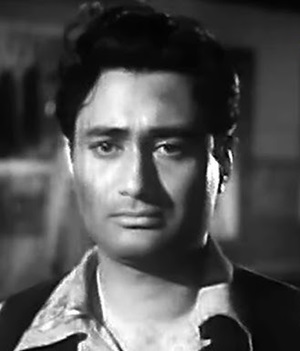 Navketan’s Funtoosh, a film directed by Chetan Anand was a comedy with Dev Anand acting as a half-crazy, carefree person exploited by a rich man. The word Funtoosh was first used in a dialogue in Navketan’s Taxi Driver, derived from a regional slang, meaning good for nothing. Differences cropped up between Chetan Anand and his brothers, during the film’s production. SD Burman’s tunes were very popular. For the first time, Kishore lent his voice to all of Dev’s songs in a Navketan film. Dukhi Man Mere, Kishore Kumar’s first successful sad song stood out from the others. When SD Burman wanted Kishore to sing Dukhi man mere, Chetan Anand and Dev Anand objected. They wanted Talat Mahmood or Hemant Kumar to sing it. But SD Burman insisted, saying that he was very confident that Kishore would sing the song well. All other Kishore Kumar songs, Ae meri topi palat ke aa, Woh dekhe tho unki inayat, Hamen aaj koi na chhediyo, and Denewala jab bhi deta were hits. Ae meri topi palat ke aa was composed by Rahul Dev Burman, nicknamed Pancham, but credited to SD Burman. When Pancham confronted his father, the latter hugged him and said he was just testing him, adding that the success of the tune showed he had a good future.
Navketan’s Funtoosh, a film directed by Chetan Anand was a comedy with Dev Anand acting as a half-crazy, carefree person exploited by a rich man. The word Funtoosh was first used in a dialogue in Navketan’s Taxi Driver, derived from a regional slang, meaning good for nothing. Differences cropped up between Chetan Anand and his brothers, during the film’s production. SD Burman’s tunes were very popular. For the first time, Kishore lent his voice to all of Dev’s songs in a Navketan film. Dukhi Man Mere, Kishore Kumar’s first successful sad song stood out from the others. When SD Burman wanted Kishore to sing Dukhi man mere, Chetan Anand and Dev Anand objected. They wanted Talat Mahmood or Hemant Kumar to sing it. But SD Burman insisted, saying that he was very confident that Kishore would sing the song well. All other Kishore Kumar songs, Ae meri topi palat ke aa, Woh dekhe tho unki inayat, Hamen aaj koi na chhediyo, and Denewala jab bhi deta were hits. Ae meri topi palat ke aa was composed by Rahul Dev Burman, nicknamed Pancham, but credited to SD Burman. When Pancham confronted his father, the latter hugged him and said he was just testing him, adding that the success of the tune showed he had a good future.
Nau Do Gyarah, starring Dev Anand and Kalpana Kartik, was the first film directed by Vijay Anand. It is a comedy thriller in which the lead pair spend much time on the road. Once again, SD Burman's tunes became very popular. Kishore Kumar’s solo Hum hain rahi pyar ke is one of his evergreen songs and his duet with Asha Bhonsle, Aankhon Mein kya ji is one of my favourites, so are Mohammed Rafi and Asha Bhonsle duets, Kali ke roop mein and soja nindiya ki bela hai.
Kala Pani was a thriller directed by Raj Khosla starring Dev Anand, Madhubala and Nalini Jaywant, based on A.J. Cronin's novel Beyond This Place. The film was ranked eighth among the highest-grossing films of 1958. Dev Anand won his first Filmfare Award as Best Actor and Nalini Jaywant won the award for Best Supporting Actress. Hum bekhudi mein tumko pukarey chale gaye sung by Mohammed Rafi, Achha ji main haari, and Nazar lagi raja torey bangley per sung by Asha Bhonsle are among SD Burman’s best compositions.
Solva Saal was another film directed by Raj Khosla. Waheeda Rehman was teamed with Dev Anand again, with SD Burman providing music. Hemant Kumar’s Hai apna dil to Awara, with its memorable mouth organ refrain by R. D. Burman in the background, gave life to Solva Saal. It is an evergreen hit that people hum to this day. Mohammed Rafi’s Suna hoga aapne also became popular. Subodh Mukherjee’s independent production Love Marriage was a moderately successful film. Shankar-Jaikishen's tunes Dheere dheere chal, and Kahan jaa rahe the were popular. Teen kanashtar peet peet kar was composed to decry the trend of Hindi film composers to import Western tunes.
BR Chopra’s first independent production Ek Hi Rasta, with a thought-provoking story, cemented his position as a quality filmmaker. Hemant Kumar’s Chali gori pi ke milan ko chali and his duet with Lata Mangeshkar, Saonle salone aye din bahar ke were popular. BR Chopra’s next film, Naya Daur (1957), confirmed his position. For this film, Dilip Kumar won his fourth Filmfare Award for Best Actor, his third in a row.
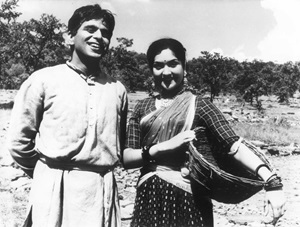 There was an unseemly row about the casting. Originally, Madhubala was signed up to play the heroine but her father Ataullah Khan, who was against her affair with leading man Dilip Kumar, refused to allow her to travel to Bhopal to shoot the film, to prevent proximity between the leading pair. BR Chopra replaced Madhubala with Vyjayantimala, and sued Madhubala and her father to refund the cash advance paid for signing. BR Chopra won the case amid much negative publicity for Madhubala and her father.
There was an unseemly row about the casting. Originally, Madhubala was signed up to play the heroine but her father Ataullah Khan, who was against her affair with leading man Dilip Kumar, refused to allow her to travel to Bhopal to shoot the film, to prevent proximity between the leading pair. BR Chopra replaced Madhubala with Vyjayantimala, and sued Madhubala and her father to refund the cash advance paid for signing. BR Chopra won the case amid much negative publicity for Madhubala and her father.
For Vyjayantimala, working with Dilip Kumar was a continuation of the learning experience that began with Devdas. “When he had to ride the Tonga, I remember how hassled he was, and how much he practiced to ride it” she recalls. OP Nayyar’s music and Sahir Ludhianvi’s lyrics gave us some memorable songs. Sathi hath badhana, Ude jab jab zulfen teri, Ye desh hai veer jawanon ka, and Mang ke sath tumhara were hits. Mai bambai ka babu, on Johnny Walker, is one of my favourites.
26-Oct-2024
More by : Ramarao Annavarapu

|
OMG! What a wealth of information about every aspect of the films of yore! You are an exceptional researcher and analyst. Yes, it should be compiled in book form. |

|
Thank you very much, Rakesh for your kind words. I am planning to compile the articles into a book. It may take some time. Meanwhile, call me at your convenience on 8008044637 or message me on WhatsApp. |

|
Dear Shri Ramarao, Your pieces are absolutely delightful. May I make a suggestion? Please publish these articles in a book form after you have finished with this series. Warm regards, Rakesh Misra ex GM SOUTHERN RAILWAY |